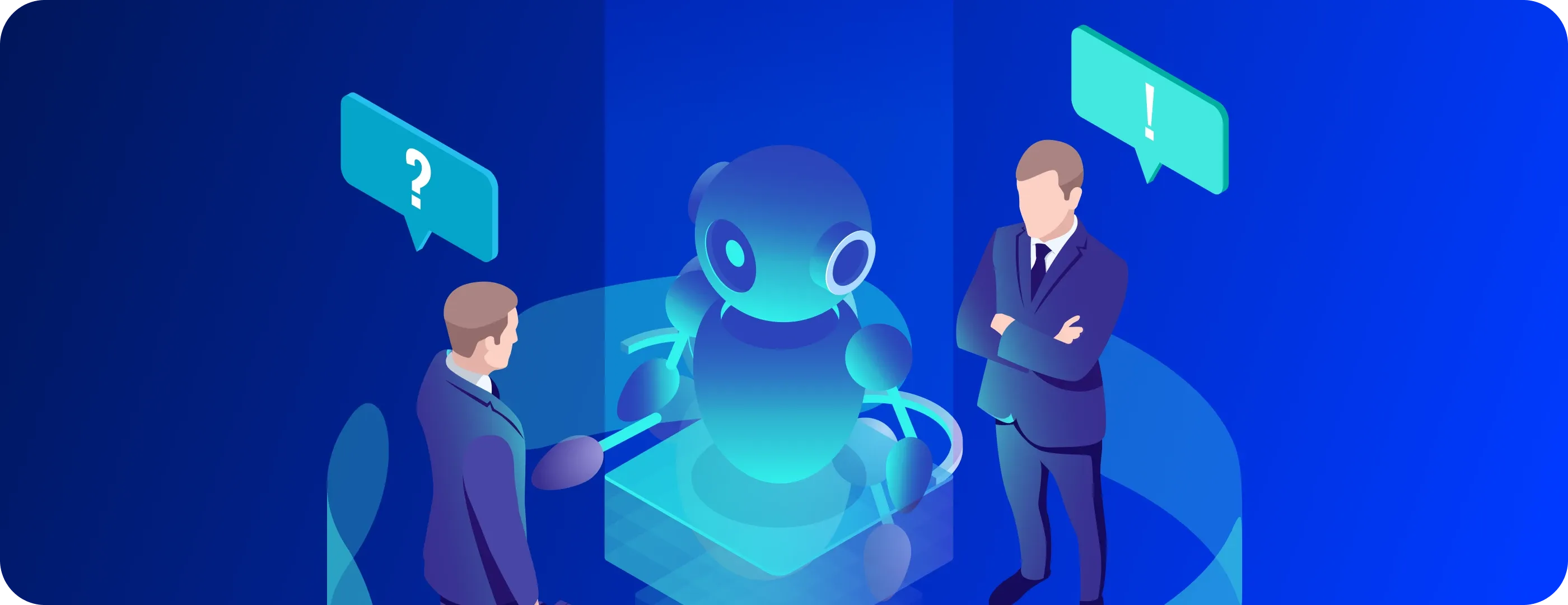
Struggling with manual recruiting processes? Find out how to use AI in recruitment to facilitate your hiring process, reduce time-to-hire, and improve the overall hiring outcomes.
This guide will outline the activities you want to automate, the primary advantages of doing so for your organization, and key indicators that suggest you need to introduce AI to the hiring process.
TL;DR: How AI in recruitment makes hiring quicker, cheaper, and more accurate
AI-powered recruiting tools automate tasks such as candidate sourcing, outreach, resume screening, evaluations, interview scheduling, communication, post-interview checks, offer management, onboarding, and analytics.
The automated hiring process delivers faster time-to-hire, better candidate matching, lower costs, improved experience, reduced bias, scalability, data-driven insights, and stronger collaboration.
Automation of recruitment process: What it is, how it works, and why it matters
Recruiting automation is the use of AI to handle repetitive tasks such as resume screening, candidate sourcing, interview scheduling, and communication, while increasing efficiency and reducing time-to-hire.
Organizations can implement these solutions through specialized AI integration services, or opt for custom AI development to build recruitment tools tailored to their unique workflows and business needs.
How AI in the hiring process works
Recruiting automation tools rely on algorithms and AI to scan and shortlist candidates based on predefined criteria, automatically manage interview logistics, and provide insights from recruiting data.
Automation in recruitment works by combining several key components:
Artificial Intelligence or Machine Learning. AI is capable of handling unstructured data, such as recordings of interviews, conversations with applicants, and resumes, and learns through patterns and context, making smarter decisions over time.
Natural Language Processing. NLP enables systems to comprehend human language in resumes, job descriptions, and interactions with candidates, enhancing role matching.
Predictive analytics. Predictive models enable the forecasting of candidate success rates and their best fit for vacant positions by examining past hiring data and performance rates.
Why AI in the recruiting process matters
Recruiting automation speeds up the process of candidate finding and evaluation, decreases the workload on the administrative side, and streamlines the communication process with candidates. It also equips recruiters with data-driven insights, enabling scalability, consistency, and cost savings. With the competitive talent market, AI in recruitment is not a luxury anymore, but a necessity towards developing an efficient and sustainable recruitment process.
Which recruiting tasks can be automated?
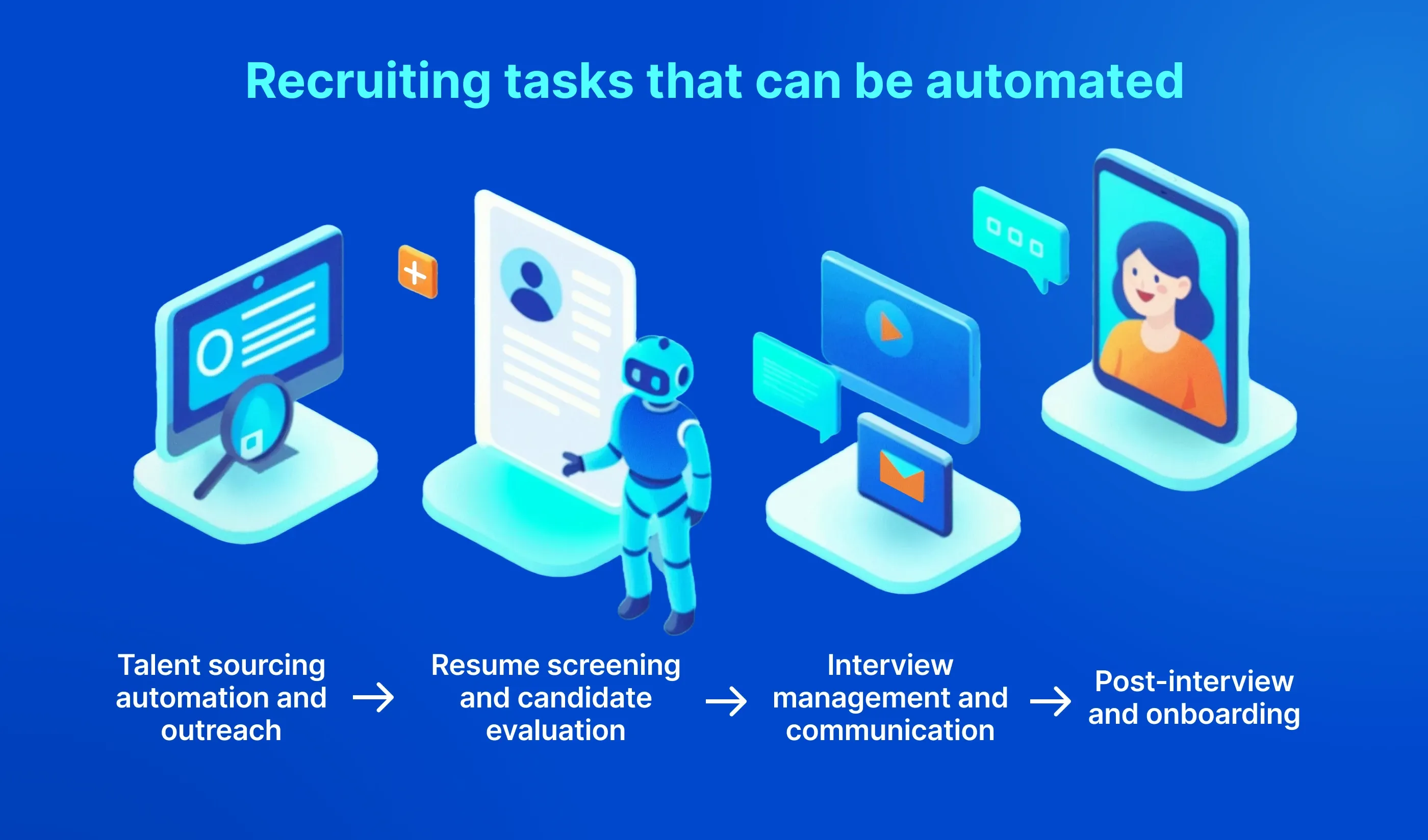
Let’s explore what specific tasks can be automated with AI tools, organized into clear and distinct categories for better understanding.
Talent sourcing automation and outreach
Job posting and distribution
Through automated systems, job openings can be posted across various platforms, job boards, social media, and company websites simultaneously, thus saving time and effort while making sure that maximum visibility is achieved.
Candidate sourcing
AI-driven technologies process large databases, social networks, and internet resources to find candidates that meet certain skills, experience, and qualifications. The systems are able to process not only resume keywords but also career pathways and industry knowledge.
Automated outreach
An automated system can send personalized email campaigns and follow-up sequences tailored to candidate profiles and engagement. The system records responses, schedules follow-ups, and maintains regular communication without requiring manual intervention.
Employee referral management
AI in recruitment can notify employees about open positions and referral opportunities, making it easier for companies to leverage their internal networks.
Resume screening and candidate evaluation
Resume parsing and analysis
AI systems extract, examine, and rank applications based on skills, experience, certifications, and qualifications. It is not only about matching keys to get the context, career progression, and skill relevance.
Pre-screening questionnaires
Automated questionnaires can filter candidates based on a specific set of criteria (availability, salary demands, location, technical skills). The answers are automatically graded and ranked to select the most promising applicants.
Skills assessments
Thousands of role-specific assessments can be automatically assigned and tested, including both technical coding and behavioral assessments. Scoring is done automatically, and results are incorporated in candidate profiles.
Candidate matching
More sophisticated algorithms analyze and match candidate profiles to specific job requirements, taking into account both hard skills and cultural fit indicators, patterns of career trajectory, and success predictors based on historical data.
Interview management and communication
Interview scheduling
Integration with calendar systems enables the candidate to select an available time slot, which is automatically booked and confirmed for all participants. It eliminates back-and-forth communication and reduces scheduling errors.
Interview reminders and confirmations
Automated systems send reminders to candidates and interviewers, preventing no-shows, and ensure everyone is ready.
Interview recording and analysis
AI can participate in video interviews, take notes, and highlight important moments, as well as create detailed summaries. Some systems can even analyze communication patterns, confidence levels, and other indicators of soft skills.
Candidate communication
Automated email sequences ensure that the candidate stays informed during the process, sending application confirmations, status updates, interview invitations, and follow-ups depending on their position in the hiring process.
Post-interview and onboarding
Background checks and reference verification
These processes are automatically activated when the candidate reaches a particular phase, with results directly included in the candidate profile.
Offer management
Offer letters can be automatically created using templates and candidate information, with electronic signing capabilities simplifying the acceptance process.
Onboarding automation in recruitment
New hire paperwork, training material delivery, and initial setup activities can be automated to provide all new hires with the same onboarding experience.
Analytics and reporting
Automated key metrics such as time-to-hire, candidate source effectiveness, interview-to-offer ratio, and diversity metrics are automatically monitored on comprehensive dashboards, providing insights into process optimization.
Benefits of AI in recruitment automation
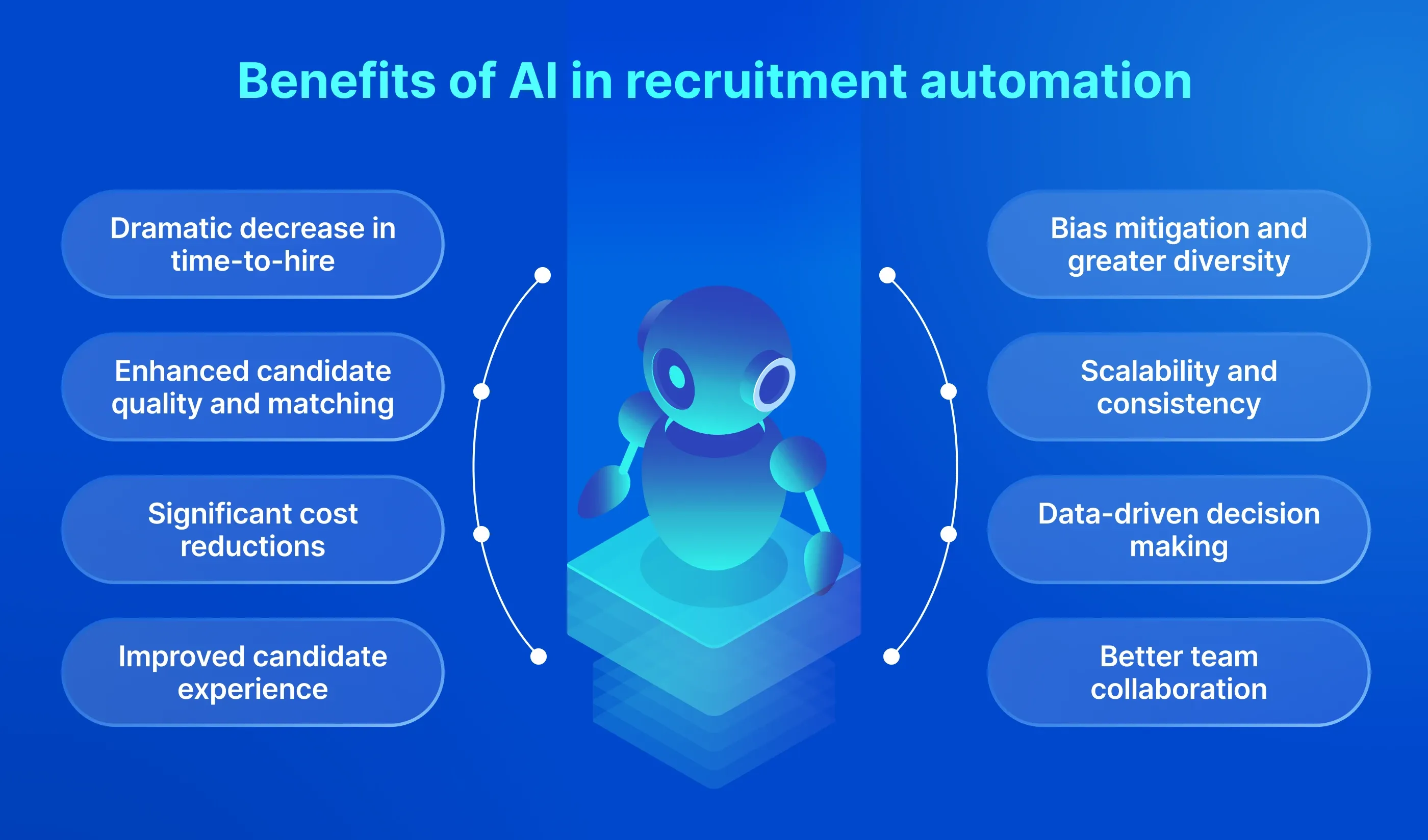
The benefits of automating the recruitment process are as follows.
Dramatic decrease in time-to-hire
Companies that automate the recruiting process frequently reduce the time-to-hiring process. Automated candidate sourcing creates quality lists within minutes, instant resume searching identifies the best candidates, and parallel processing enables multiple hiring stages to be run at the same time.
Enhanced candidate quality and matching
Artificial intelligence in hiring examines a lot more data than human recruiters and ensures more precise matching. Machine learning algorithms improve their selection criteria over time, whereas predictive analytics identify candidates most likely to succeed based on the previous hiring trends. This is a data-driven process that tends to identify strong candidates that conventional screening would not provide.
Significant cost reductions
Automation reduces direct and indirect employment costs. Direct savings include reduced manual work done, less reliance on agencies, and quicker role fulfillment. Indirect benefits include stronger candidate-job matches, enhanced retention, reduced recruiter burnout, and the ability to scale hiring without adding extra staff.
Improved candidate experience
Automation increases candidate satisfaction instead of making the hiring process impersonal. Automated updates keep applicants informed, AI chatbots offer 24/7 services, and scheduling systems eliminate interview-booking stress. The outcome is a more responsive, professional process that strengthens employer branding.
Bias mitigation and greater diversity
AI systems prioritize candidates’ skills and qualifications over demographic aspects, which reduces bias and promotes more diverse hiring. Standardized, automated screening assists in establishing more equitable hiring procedures that improve diversity.
Scalability and consistency
Automated systems scale without difficulty, regardless of whether it is 50 or 5,000 applications. They consistently maintain standards and timelines, which is particularly useful for businesses that experience rapid growth, peak season hiring spurts, or market expansions.
Data-driven decision making
Recruitment automation generates analytics on source quality, conversion stage, and time-to-productivity. Such insights can be used for continuous optimization, providing a clear picture of ROI and helping organizations streamline their strategies with confidence.
Better team collaboration
The centralized platforms ensure all the stakeholders stay on the same page with common candidate information and assessment criteria. Collaborative tools enhance communication, minimize delays, and facilitate consistency in decision-making.
Signs you are ready for recruiting automation
Recognizing when recruiting automation is needed is key to maximizing ROI and ensuring a smooth transition. The following are the signs that using AI in hiring is not only helpful but also essential to remain competitive.
If you face high-volume hiring requirements
Hiring five or more roles per month quickly makes manual procedures inefficient and error-prone. Bottlenecks can occur in each phase, which slows down the time-to-hire process. This problem increases as a result of rapid scaling or when previously functional systems can no longer cope with the complexity. AI in recruitment automation ensures the scalability and sustainability needed to overcome these obstacles.
When recruiters are overloaded or burned out
Recruiters spend a bigger part of their time on administration rather than building relations or advising managers. This can lead to missed deadlines, ineffective candidate feedback, and recruiter turnover. When your team is working overtime or has been stuck in repetitive work, automation will ease the load and refocus on strategic work.
If candidate experience metrics are poor
Delayed responses, rough scheduling, and a lack of communication make candidates feel frustrated, and your employer brand is hurt. The rate of high drop-off typically indicates friction in the application process. Artificial intelligence in recruitment helps eliminate these issues with updates, chatbots, and smooth scheduling.
When quality and consistency become issues
The results may differ significantly when various recruiters or offices employ their own approaches to candidate assessment. One team might hire strong talent, while another misses out. Automation ensures that the same standards are applied everywhere, making the process fair and consistent.
If competitive pressure is mounting
Where companies find and recruit top talent within less time than their competitors, then chances are that they are using AI in HR recruitment. Success in talent-scarce markets is directly related to efficiency. When applicants select other employers due to easier systems, then you are being dragged behind because of your manual methods.
When data and analytics fall short
It wouldn't be easy to make decisions and to optimize hiring strategies without real-time and reliable data on recruiting. Manual tracking leads to errors, outdated reports, and missed opportunities to analyze candidate sources, funnel performance, or recruiter efficiency. Automation centralizes data, offers advanced analytics, and provides dashboards with actionable metrics to measure ROI, spot bottlenecks, and improve results.
If integration challenges persist
Disconnected recruiting tools that require manual information transfer are time-consuming and prone to errors. Complex tech stacks demand constant manual upkeep, which is a strong argument for AI in hiring automation that integrates all operations and provides consistency.
When compliance and documentation become burdensome
Manual documentation is a challenge to industries that have high compliance standards. Automated systems simplify reporting by creating complete records and audit trails, reducing risk and saving time.
How DigitalSuits can help
DigitalSuits assists companies in transforming their business processes through AI development and AI integration services, including AI-powered recruiting automation. Alternatively, you may even hire AI engineers as a separate team. No matter what your goal is, reducing manual listings, increasing time-to-hire, or enhancing the objectivity of your candidate process, our dedicated development team, with expertise in genAI integration, can provide solutions tailored to your hiring challenges.
One example of how we put these solutions into practice is our collaboration with Synsel, a staffing company in the Netherlands. Their hiring managers had to deal with a set of tasks like screening CVs, emailing, and matching candidates with vacancies. To address this, we developed an AI-powered dashboard system, which:
Automated candidate-employer matching using retrieval-augmented generation (RAG)
Generated CVs and emails from interview transcripts
Scored calls to help managers improve their communication and decision-making
As a result, Synsel was able to
reduce hiring routine tasks by 30%
publish 25% more vacancies
streamlined its recruitment process with enhanced candidate-employer fit
This partnership confirms that recruiting automation isn’t just about efficiency - it gives teams the space to concentrate on building stronger networks and creating better candidate experiences.
If your company needs to implement AI-based recruiting automation, contact our company. DigitalSuits is ready to become your reliable partner and guide you from strategy to implementation, just as we did for Synsel.
Frequently asked questions
How long does it typically take to implement recruiting automation?
Timelines depend on the complexity and scope of the implementation. However, the majority of companies achieve the first benefits within 4-6 weeks. Simple automation, such as resume screening and communications, can be set up within a short timeframe. More advanced artificial intelligence in recruitment, including AI-based candidate matching and predictive analytics, can take 2–3 months to fully implement and optimize. Contact us to learn how long it would take to integrate AI in the recruitment process of your company.
Is recruiting automation going to replace human recruiters?
No. AI in recruiting automation enhances rather than replaces human recruiters. The technology processes routine administrative tasks, enabling recruiters to focus on strategic activities such as relationship building, cultural fit evaluation, and complex decision-making that require human judgment and emotional intelligence. AI in job recruitment complements human expertise by handling repetitive tasks, freeing recruiters to concentrate on high-value interactions. Contact us and our team will guide you through the right solutions tailored to your needs.
Can recruiting automation integrate with our existing ATS and HR systems?
Yes, the AI recruitment solutions are designed to integrate with existing systems using APIs and standard data formats. This means that automation augments what you already use instead of replacing the whole system, safeguarding existing technology investments in addition to new and potent capabilities. To learn how to automate the recruitment process in your current setup, contact our team for a step-by-step strategy.




























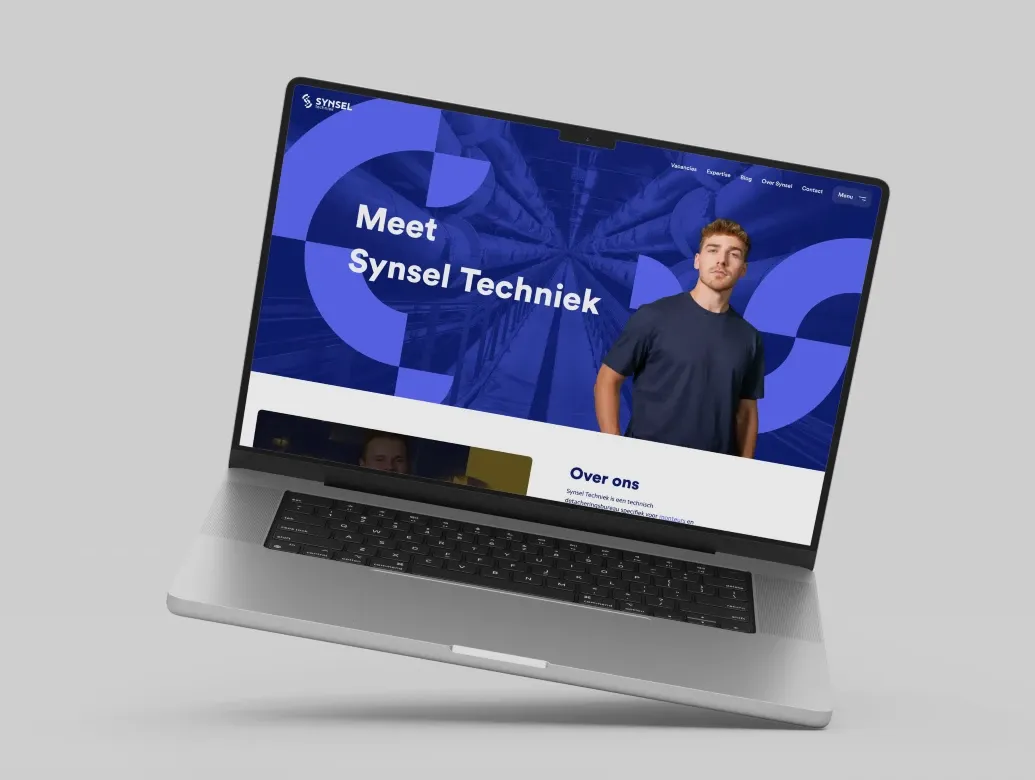
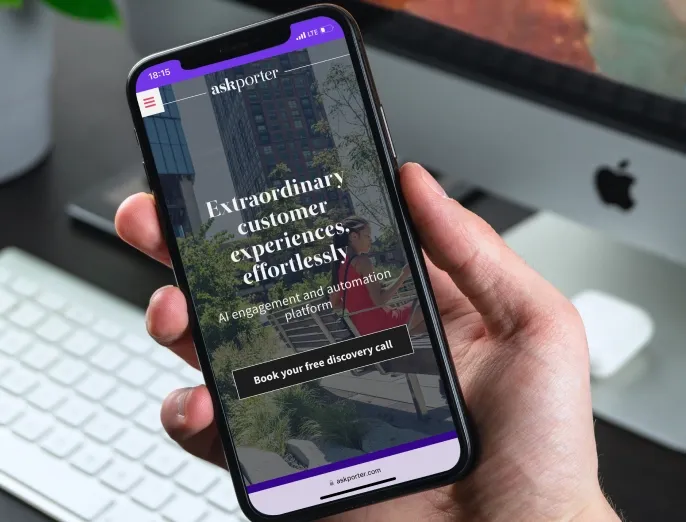
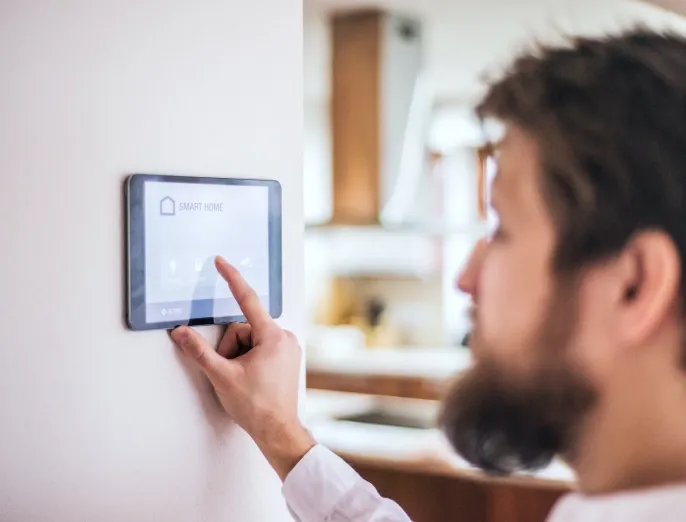
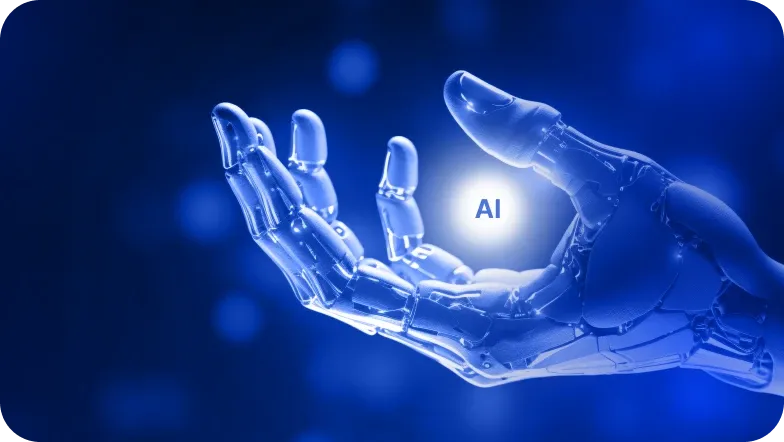
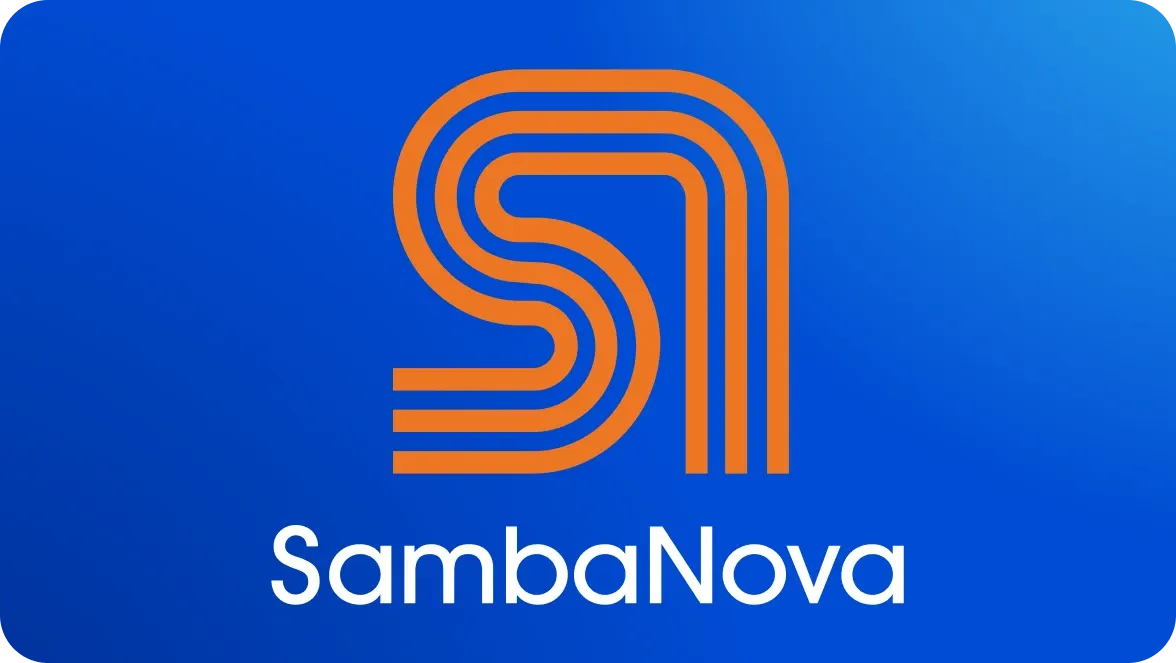
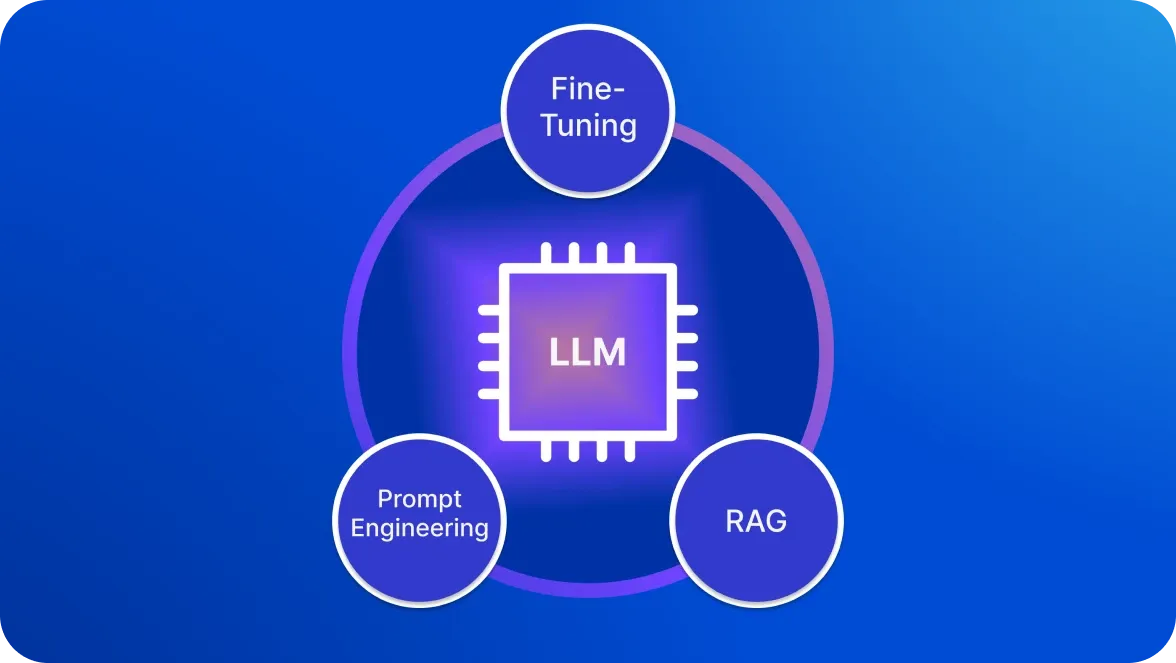
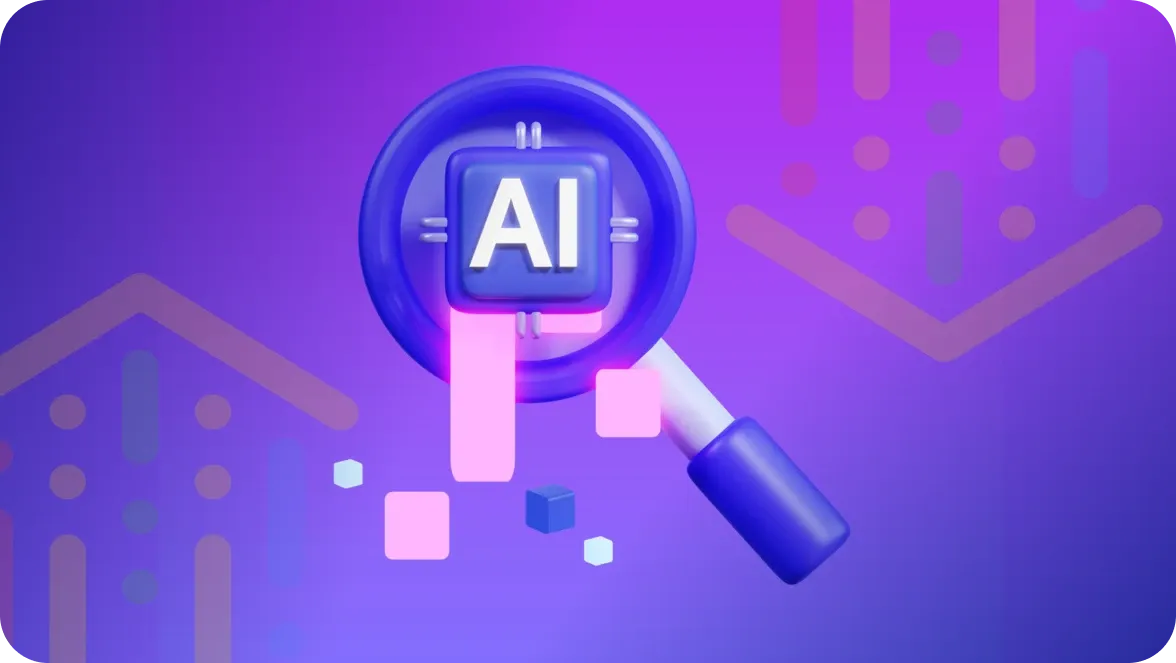
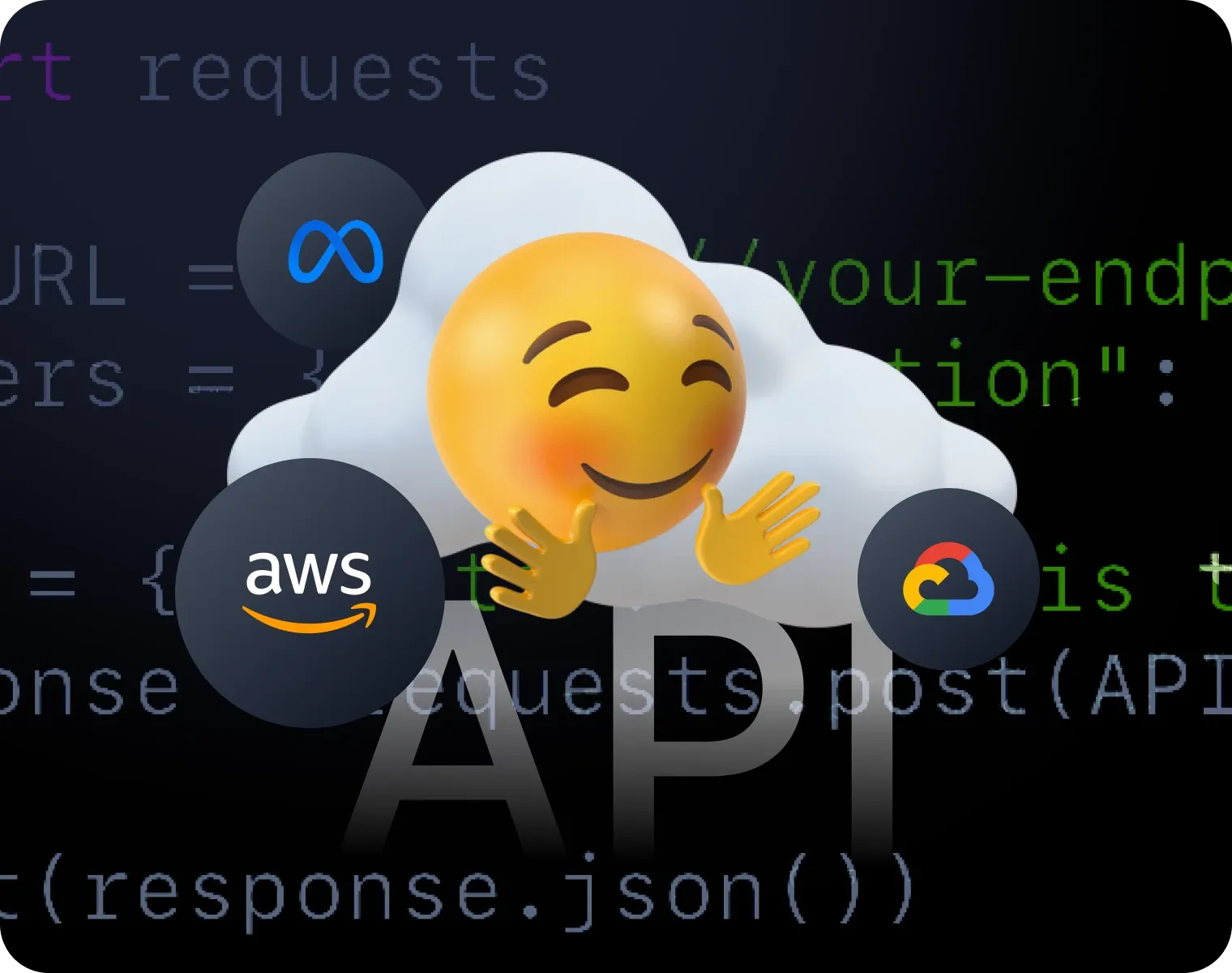




Was this helpful?
0
No comments yet